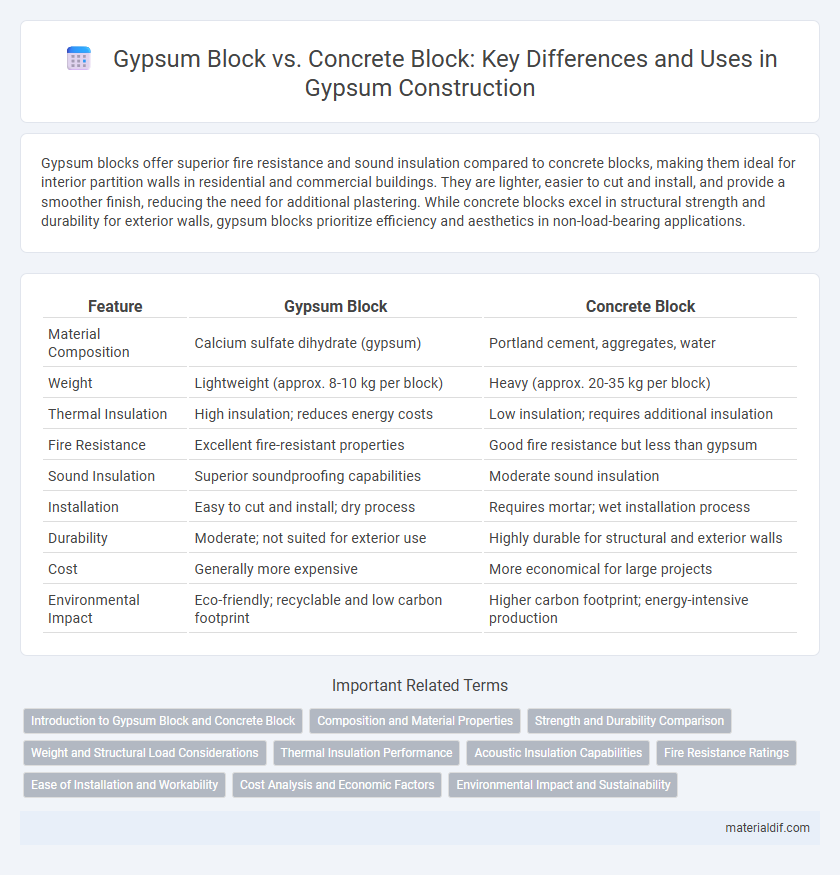Gypsum blocks offer superior fire resistance and sound insulation compared to concrete blocks, making them ideal for interior partition walls in residential and commercial buildings. They are lighter, easier to cut and install, and provide a smoother finish, reducing the need for additional plastering. While concrete blocks excel in structural strength and durability for exterior walls, gypsum blocks prioritize efficiency and aesthetics in non-load-bearing applications.
Table of Comparison
| Feature | Gypsum Block | Concrete Block |
|---|---|---|
| Material Composition | Calcium sulfate dihydrate (gypsum) | Portland cement, aggregates, water |
| Weight | Lightweight (approx. 8-10 kg per block) | Heavy (approx. 20-35 kg per block) |
| Thermal Insulation | High insulation; reduces energy costs | Low insulation; requires additional insulation |
| Fire Resistance | Excellent fire-resistant properties | Good fire resistance but less than gypsum |
| Sound Insulation | Superior soundproofing capabilities | Moderate sound insulation |
| Installation | Easy to cut and install; dry process | Requires mortar; wet installation process |
| Durability | Moderate; not suited for exterior use | Highly durable for structural and exterior walls |
| Cost | Generally more expensive | More economical for large projects |
| Environmental Impact | Eco-friendly; recyclable and low carbon footprint | Higher carbon footprint; energy-intensive production |
Introduction to Gypsum Block and Concrete Block
Gypsum blocks are lightweight construction materials made from a mixture of gypsum plaster, cement, and other additives, offering excellent fire resistance and sound insulation properties. Concrete blocks, composed primarily of cement, aggregates, and water, provide superior structural strength and durability for load-bearing walls. Both materials serve distinct purposes in construction, with gypsum blocks favored for interior partition walls and concrete blocks commonly used in exterior and load-bearing applications.
Composition and Material Properties
Gypsum blocks are primarily composed of calcium sulfate dihydrate, offering lightweight and excellent fire-resistant properties compared to concrete blocks, which consist mainly of cement, aggregates, and water. The porous structure of gypsum blocks provides superior thermal and sound insulation, while concrete blocks boast higher compressive strength and durability for structural applications. Gypsum's moisture sensitivity limits its use in wet environments, whereas concrete blocks exhibit better resistance to moisture and environmental wear.
Strength and Durability Comparison
Gypsum blocks offer moderate compressive strength, typically around 2 to 6 MPa, making them suitable for non-load-bearing partitions, while concrete blocks exhibit higher strength ranging from 7 to 25 MPa, ideal for structural applications. Durability of concrete blocks outperforms gypsum blocks as they resist moisture, weathering, and impact better, ensuring longer service life in exterior conditions. Gypsum blocks are prone to water damage and physical wear, limiting their use to interior walls with controlled environments.
Weight and Structural Load Considerations
Gypsum blocks weigh significantly less than concrete blocks, typically around 6 to 8 pounds per block compared to 35 to 40 pounds for concrete, reducing overall structural load on foundations and supporting frameworks. The lighter weight of gypsum blocks makes them ideal for non-load-bearing partition walls, minimizing the need for heavy-duty structural reinforcement common with concrete blocks. Concrete blocks, with their higher density and compressive strength, are preferred for load-bearing walls where structural integrity and durability under heavy loads are critical.
Thermal Insulation Performance
Gypsum blocks offer superior thermal insulation compared to concrete blocks due to their lower thermal conductivity, typically around 0.17 W/m*K versus concrete's 1.4 W/m*K. This characteristic makes gypsum blocks more effective in maintaining indoor temperature stability, reducing heating and cooling energy consumption. The porous structure of gypsum enhances its insulation properties, contributing to improved energy efficiency in building construction.
Acoustic Insulation Capabilities
Gypsum blocks offer superior acoustic insulation capabilities compared to concrete blocks due to their porous structure, which effectively absorbs and dampens sound waves. Concrete blocks, while structurally robust, have higher density that tends to reflect sound rather than absorb it, resulting in increased noise transmission. For environments requiring enhanced soundproofing, gypsum blocks are often preferred to minimize noise pollution and improve acoustic comfort.
Fire Resistance Ratings
Gypsum blocks offer superior fire resistance compared to concrete blocks, with fire ratings typically ranging from 1 to 4 hours depending on thickness and composition. The core of gypsum blocks contains chemically bound water that releases steam when exposed to high temperatures, effectively slowing heat transfer and enhancing fire protection. In contrast, concrete blocks generally provide fire resistance between 1 to 3 hours but lack the intumescent properties that improve fire resistance in gypsum products.
Ease of Installation and Workability
Gypsum blocks offer superior ease of installation compared to concrete blocks due to their lighter weight and uniform size, which simplifies handling and reduces labor effort. Their smooth surface and precise dimensions allow for faster cutting, shaping, and fitting, enhancing overall workability on construction sites. In contrast, concrete blocks are heavier and more abrasive, requiring more time and specialized tools for modification and installation.
Cost Analysis and Economic Factors
Gypsum blocks generally offer lower initial material costs and faster installation times compared to concrete blocks, reducing overall labor expenses. Concrete blocks, while potentially more expensive upfront, provide greater structural strength and durability, potentially lowering long-term maintenance and replacement costs. Economic factors such as project scale, local material availability, and specific application requirements critically influence the cost-effectiveness between gypsum and concrete block use.
Environmental Impact and Sustainability
Gypsum blocks have a lower environmental impact compared to concrete blocks due to their production process, which emits less CO2 and consumes less energy. These blocks are made from natural gypsum, a renewable material, and are fully recyclable, enhancing their sustainability profile. Concrete blocks involve cement manufacturing, a major source of carbon emissions, making gypsum blocks a greener alternative for eco-friendly construction.
Gypsum block vs Concrete block Infographic

 materialdif.com
materialdif.com